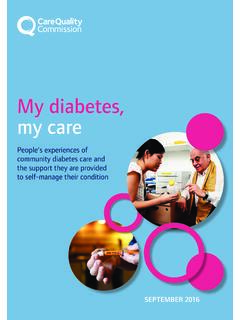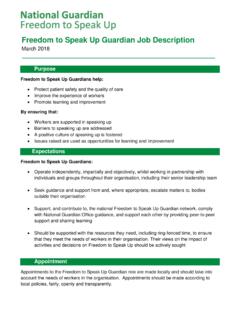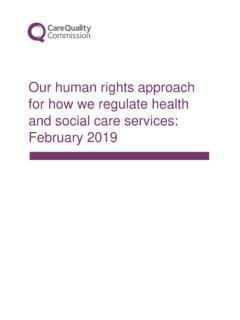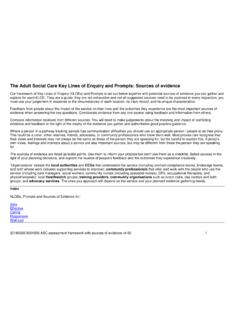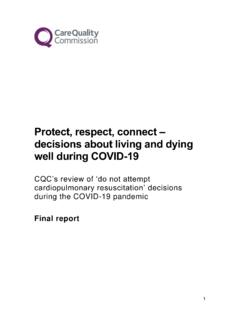Transcription of Mental health rehabilitation inpatient services
1 Mental health rehabilitation inpatient services Ward types, bed numbers and use by clinical commissioning groups and NHS trusts March 2018. Contents Summary .. 2. Introduction .. 4. Methods .. 7. Caveats and limitations .. 7. Findings .. 8. Completeness of the data return .. 8. The wards .. 8. The patients .. 10. commissioning .. 11. Extent of dislocation .. 15. Costs .. 17. Recommendations .. 19. 1. Summary Mental health rehabilitation inpatient services work with individuals with complex psychosis whose needs cannot be met by general adult Mental health services . Although they are an essential element of a comprehensive Mental health care system, the Care Quality Commission (CQC) is concerned about the high number of beds in Mental health rehabilitation wards that are situated a long way from the patient's home.
2 This could result in people becoming isolated from their friends and families and cut off from the local services that will provide care following discharge. To explore this concern further, we sent an information request to all providers that manage Mental health rehabilitation inpatient services . This work was done in collaboration with NHS England and NHS Improvement. We estimate that the information request yielded data on between 85% and 90% of all rehabilitation wards in England. The analysis was of 3,721 patients on 311 wards, provided at 203 locations, managed by 134 provider organisations.
3 The independent sector provided 53% of beds (2,347 independent sector beds compared with 2,050 NHS beds). Two-thirds of the patients were men. Eleven per cent of patients were subject to a restriction order and 75% were detained under the Mental health Act. 1 The median length of stay on the ward where they were at the time of the information return was 323 days but the patients had been in some form of Mental health hospital continuously for more than twice as long (median of 683 days). The main conclusions are: 1. People are often receiving care a long way from where they live and from their support networks, which in turn can affect their onward recovery and wellbeing.
4 2. People are being accommodated in services that are dislocated' from their home areas. This is more prevalent in the independent sector than in NHS services : Independent sector patients were on average further away from their home address (49km) compared with NHS patients (14km). Their patients were much more likely to be on a ward located in a different area to the clinical commissioning group (CCG) that funded the placement (78% of patients placed out of area were in an independent sector bed). Service managers were less able to name the NHS Mental health trust responsible for providing aftercare for the patient: managers of independent sector services could name the responsible trust for 53% of patients; managers of NHS services could name the responsible trust for 99% of patients.
5 1. There was almost complete overlap between those patients who were noted in the information return as subject to a restriction order and those who were noted as subject to the Mental health Act. 2. 3. There are also other differences between the two sectors. Compared with the NHS, the independent sector: Provided more wards that were categorised as either locked rehabilitation or complex care (75% of wards of this type) and fewer wards categorised as long stay, community or high dependency (25% of beds of this type). Accommodated patients who had been on that particular ward for longer (median 444 days compared with 230 days in the NHS) and in hospital continuously for longer (median 952 days compared with 492 days in the NHS).
6 Because of the longer length of stay, accommodated patients whose current placement had cost twice as much (median 162K compared with 81K). 4. There is very wide variation between CCG areas in the use of rehabilitation beds, and in the use of beds that are out of area: 11 CCGs did not fund the care of any of the patients in the cohort. The top 20%. of CCGs funded 47% of all places (a total of 1,752 beds). We asked the managers of the wards to name the NHS Mental health trust that would be responsible for the aftercare of each patient. When we collated this information, we found that the number of patients that NHS trusts had placed out of area with another provider ranged from 0 to 85.
7 The only NHS provider not named as having a patient cared for by another provider was Sheffield health and Social Care NHS Foundation Trust, which had instituted a programme to return those placed in out of area wards to the care of local services (see page 5). 5. This is a costly element of provision: We estimate that the annual expenditure on Mental health rehabilitation beds is about 535 million. Out of area placements account for about two-thirds of this expenditure. We estimate that the 10% of CCGs that fund the highest number of places are spending an average of at least 19,000 per day on this element of provision.
8 Of which 8,200 is spent on independent sector provision; the majority of which is out of area. In response to these findings, we have recommended that the Department of health and Social Care, NHS England and NHS Improvement agree a plan to engage local health and care systems in a programme of work to reduce the number of patients placed in Mental health rehabilitation wards that are out of area. 3. Introduction Mental health rehabilitation services are an essential element of a comprehensive Mental health care system. They work with individuals with complex psychosis, or other serious Mental health problems, whose needs cannot be met by general adult Mental health services .
9 Up to 20% of people newly diagnosed with psychosis will develop complex problems and require rehabilitation services . On average, people referred for rehabilitation care have been in contact with Mental health services for more than 13. years and have had repeated admissions. The problems they experience include hallucinations and delusions that have not responded to medication, severe negative'. symptoms that affect motivation and organisational skills, and co-existing physical and Mental health problems that further impair their recovery and can result in challenging behaviours.
10 Mental health rehabilitation services provide specialist assessment, treatment and support to stabilise the person's symptoms and help them gain/regain the skills and confidence to live successfully in the community. They are often the next step in a pathway for people moving on from acute inpatient services or from secure services who have not recovered sufficiently to be discharged home. In 2016, the Joint commissioning Panel for Mental health (JCPMH) 2 issued guidance for commissioners on rehabilitation services for people with complex Mental health needs. 3 This stated that good rehabilitation services operate as a whole system that includes a range of other agencies and organisations.

